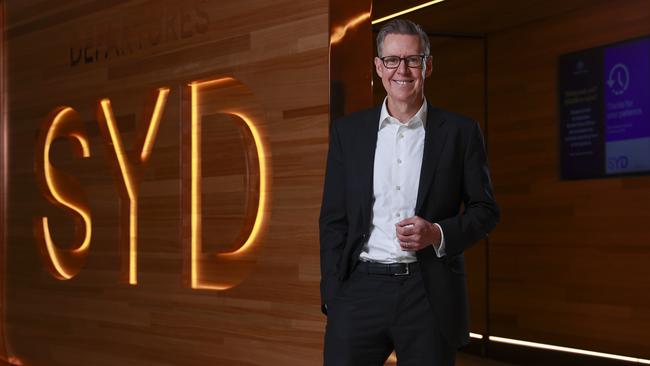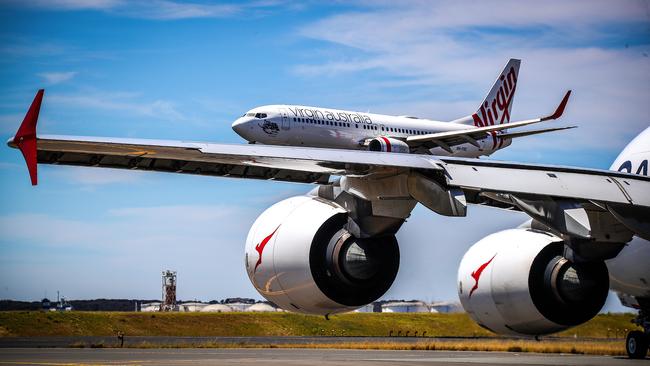Sydney Airport CEO’s outspokenness delivers for travellers
Departing Sydney Airport boss Geoff Culbert says he has patched up his troubled relationship with Qantas, with six years “about the right tenure for a CEO”.

After six years at the helm of Australia’s biggest gateway, Geoff Culbert will leave Sydney Airport on Friday confident major changes are in train to improve the lives of travellers.
As one of Australia’s most outspoken chief executives, Mr Culbert has made a point of calling out airlines and governments on everything from slot hoarding and airfares to outdated policy and Covid management.
He was among the first business leaders to slam “inhumane” border closures during the pandemic, accused tourism bosses of lacking in ambition over visitor targets and took on Qantas over flight cancellations.
He accused the national carrier of maintaining more slots than needed at Sydney Airport to keep out competitors, and then axing excess flights.
On Wednesday Mr Culbert said it gave him no pleasure to publicly criticise Qantas but it was “necessary given the impact on the airport’s efficiency and on customers”.
“I felt it was my responsibility to call out things that were happening that I didn’t think were right but ultimately in the long term a successful Qantas is in the best interests of Sydney Airport, the Australian economy and the Australian travelling public,” he said.
“I’ve actually got a good relationship with Vanessa (Hudson) and we’ve had a number of catch-ups since she came into the role. I’m cheering for her, and I’m hoping she’s successful in the job.”
There were no warm words for her predecessor, Alan Joyce, who departed Qantas in September after almost 15 years in the job.
Mr Culbert said in his own experience, six to seven years was “about the right tenure for a CEO” which was why he was moving on from Sydney Airport.
“After about this period of time, I think you become rusted on to your own ideas, and businesses need fresh ideas and opinions,” he said. “I think the other thing that happens when you’ve been in a job for this length of time, is it becomes your identity, it’s hard to leave and then you become even more rusted on and you can outstay your welcome.”
Although slot hoarding remained a concern, Mr Culbert was hopeful the Albanese government would act on the issue by adopting the recommendations of the 2021 Harris Review.

An announcement from Transport Minister Catherine King was expected “if not before Christmas, then in the first quarter of 2024” making it harder for airlines to maintain slots if flights were regularly cancelled.
“I’m pleased with the progress we’ve made with the visibility of the rules that apply to Sydney Airport, the impact they have on passengers and the need for change,” said Mr Culbert.
“There’s a recognition that behaviour with respect to slots is having a negative impact on customers with high cancellation rates. That’s now under the microscope as it should be.”
Other improvements in the pipeline relate to constraints on Sydney Airport, that have impaired the gateway’s ability to recover from weather disruptions.
For more than 20-years, the airport has operated to an 80-flights an hour cap, measured in 15-minute increments.
Mr Culbert said something that worked in the late 1990s when Sydney Airport had 20 million passengers, should not still be in place in 2023 with double the number of users.
“We are not asking for the cap or the curfew (to go) we just want to be able to get to 80-flights an hour so we can reduce the level of cancellations and delays,” he said.
His pride at returning Sydney Airport to its pre-Covid financial strength was tempered by regret at not making more use of the quiet pandemic years to upgrade the T2 terminal and B1 carpark.
“It would’ve been a perfect time to accelerate that investment but we were losing millions of dollars a week, and we had no visibility as to when Covid was going to end,” said Mr Culbert.
After Friday, Mr Culbert’s experience of Sydney Airport will be as passenger rather than employee, as he takes a holiday before stepping into his new role as president of the Business Council of Australia in February.





To join the conversation, please log in. Don't have an account? Register
Join the conversation, you are commenting as Logout